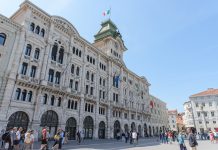by Guisela Chiarella
Interview: FVG governor, Massimiliano Fedriga
US President Donald J. Trump has announced sweeping new tariffs on European Union goods, reigniting trade tensions between the U.S. and Brussels. In a letter addressed to European Commission President Ursula von der Leyen—and shared publicly via his Truth Social account—Trump confirmed that a 30% tariff will take effect on all EU imports beginning August 1. He also warned that if the EU retaliates, he is prepared to double the tariffs.
The move marks a return to Trump’s combative trade strategy as he campaigns for a second term in office. European leaders are expected to convene in Brussels on Sunday for an emergency meeting to coordinate a response.
Italy, one of Europe’s top exporters to the United States, is particularly vulnerable. According to new estimates by the CGIA of Mestre, based on OECD data, current tariff levels could cost Italy €3.5 billion in lost exports. If the tariffs were to rise to 20%, losses could climb as high as €12 billion. In 2024, Italy exported €64.7 billion worth of goods to the United States.
The Friuli Venezia Giulia region alone could see losses of up to €1 billion, according to the CGIA’s research center—a figure they describe as “very conservative.”
Massimiliano Fedriga, governor of the Friuli Venezia Giulia region, warned that the proposed tariffs would deal “enormous damage” not only to Europe but also to the United States. “The alliance between Europe and the U.S.—not only political but also commercial—has long ensured significant prosperity for both sides,” he said in a statement. “We must continue negotiating with the American administration in a responsible manner, without hysterical reactions, while doing everything we can to protect our industries.” Fedriga also cautioned that a full-blown trade war would ultimately harm the United States as well.
Though the tone of Trump’s letter was aggressive, he did leave the door open to future negotiations—on the condition that European countries open their markets to American products and dismantle what he described as protectionist policies and trade barriers.
As markets react and European leaders weigh their options, Sunday’s Coreper meeting in Brussels is likely to set the tone for the EU’s next move in what could become a costly transatlantic trade dispute.




























